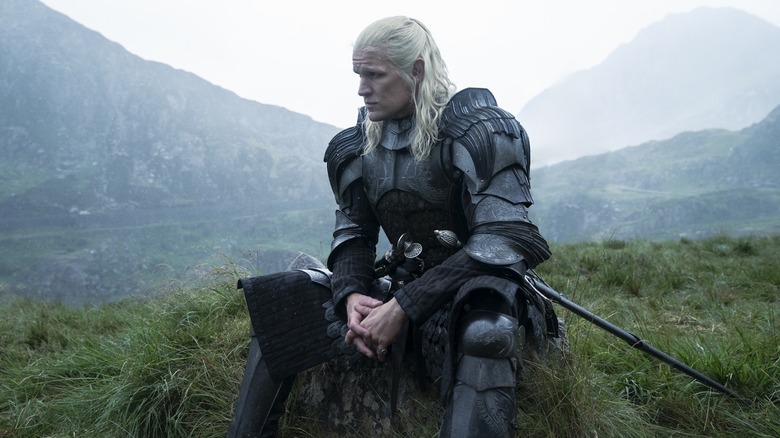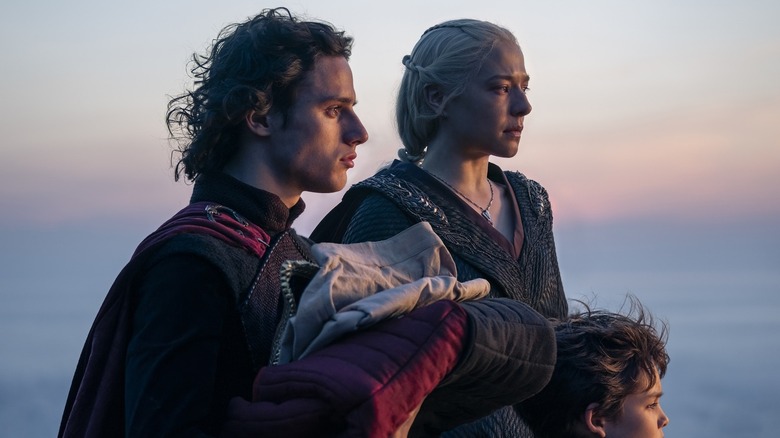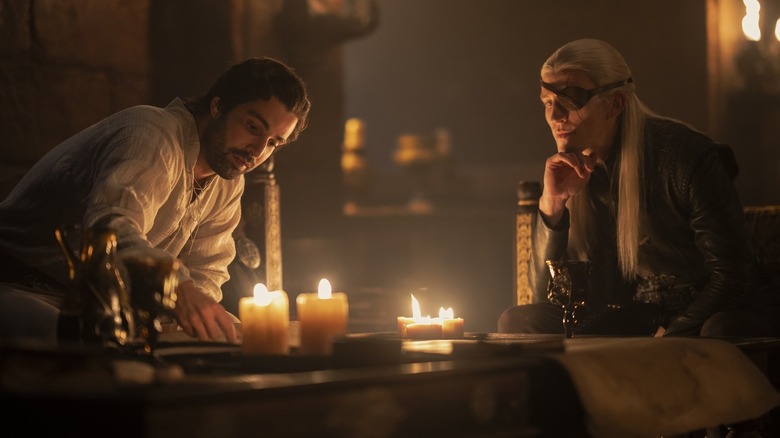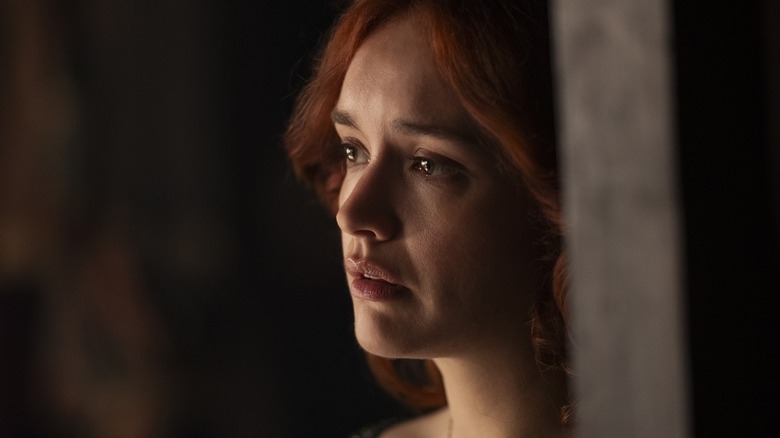House Of The Dragon Season 2 Review: Game Of Thrones, But Moreso In This Terrific Second Season
"House of the Dragon" was always going to live in the shadow of "Game of Thrones." The big question was how effectively it could operate in that shadow, and if it could carve out its own identity while weathering constant comparisons to the series that spawned it. The show's first season was an often remarkable proof of concept — yes, this was another show set in author George R.R. Martin's fantasy kingdom of Westeros, but it had its own flavor, its own tone. Spanning decades (and recasting several key characters halfway through the season as they aged up), it was a show operating at a sprint, hungry to prove itself, and hungry to prove itself entirely self-reliant, that it is its own show.
The funny thing about the long-awaited second season of "House of the Dragon," after all that grand distance established in the first outing, is how much it feels like "Game of Thrones." And by that, I specifically mean the best years of the original show, back when it united audiences with shock and awe rather than grumbling. If season 1 was entirely about establishing the parameters of the prequel series, the new rules so to speak, season 2 quietly shifts gears into a more familiar, but welcome mode. "House of the Dragon" so clearly established its identity in season 1 that season 2 is able to latch onto the pleasures that made the first four seasons of "Game of Thrones" such addictive, remarkable television without feeling redundant.
Yes, Showrunner Ryan Condal and his sprawling cast of violent, frequently incestuous medieval fantasy psychopaths are able to have their cake and eat it too. The new episodes of "House of the Dragon" are terrific, that perfect blend of slow-burn intrigue, massive action, and skeevy behavior that walks a fine line between feeling soap operatic and strangely historical.
House of the Dragon season 2 is big action and small drama
After the breakneck pace of the first season, with its sometimes discombobulating years-long time jumps between episodes, the new season borrows from the original "Game of Thrones" in another key way: It's a slow burn. Much like how the parent show would take several episodes to move pieces around the chessboard, carefully orchestrating various characters and factions on collision courses before ruthlessly pulling the trigger, "House of the Dragon" doesn't use the world-shaking deaths from the end of season 1 to catapult its characters into instant war. Instead, those shocking moments serve to send the opposing figureheads of the brewing Targaryen civil war into an almost blindsided caution.
Yes, there are horrifying acts of violence in the earliest episodes of the season (including one murder that will have everyone talking), but the true tension comes from non-action, as everyone circles one another and ... waits. No one wants to make the first move. Everyone wants to look like the hero. "House of the Dragon" is a show about legacy and image, about how the people in power conduct wars on battlefields, in private chambers, and in the minds of the "small folk" whose adoration or hatred can make or break a claim on the throne.
"House of the Dragon" ultimately does deliver the lavish and horror-tinged war sequences that defined the later seasons of "Game of Thrones," but it's these early moments that stick with the viewer. Those battles wouldn't have their skin-crawling effectiveness if they weren't built with such deliberate pacing, such a strong sense of sheer, often unavoidable calamity from both sides. But it's most impressive that a show this expensive and told on such a large scale can feel so intimate, that its most exciting sequences are often the Small Council scenes where characters slide tokens around maps, push each other's buttons, and prepare for the worst.
Character remains the weak spot for House of the Dragon
Perhaps it's appropriate that the characters in "House of the Dragon" continuously talk about the late King Viserys, and ponder what he would've done, and what he would've wanted, because his absence points to perhaps the only aspect of the series that proves slightly underwhelming. With that character gone, there aren't many characters that fascinate and compel on his level.
Do I like Rhaenyra Targaryen, find her interesting, and think Emma D'Arcy is quite good in the part? I sure do. Do I find myself continuously intrigued by the choices of the unpredictable Daemon Targaryen (Matt Smith), the pragmatic Otto Hightower (Rhys Ifans), and the put-upon Alicent Hightower (Olivia Cooke)? Indeed. But if I enjoy watching all of these characters, and if I'm invested in their fates at this point, why don't I love any of them? "House of the Dragon" is masterful in its plotting, and watching these characters butt heads and scheme against and with one another is must-see television, but I've yet to go ride-or-die for any of them, like I did in the past with characters like Arya Stark or Tyrion Lannister.
Perhaps that's a strange side effect of the show's "shades of grey" approach to its cast. It's not easy to pick a side in this brewing conflict, and there's no one as unimpeachably noble as Ned Stark or Jon Snow, and no one as truly malicious as Tywin or Cersei. The narrative is murkier, funkier, harder to parse by design, and that makes the characters forced to navigate its labyrinth harder to root for or against. "House of the Dragon" is a slow-motion disaster, as characters you kinda like and kinda hate are drawn into the inevitable via choices that always make sense depending on the perspective taken. It's always fascinating. It's always compelling. But I'm still waiting to fall in love with these characters themselves, as much as I love their awful decisions.
House of the Dragon season 2 invites, and deserves, Game of Thrones comparisons
In writing this review, I've fallen into the hole "House of the Dragon" probably wants us to avoid: I'm directly comparing the show to "Game of Thrones." But how could I not? At its best, this show continues to lean into what made the original series a phenomenon, and it seems keen to actively avoid the elements that turned so many fans against it in the final years. There's an irony to a prequel series, set hundreds of years before the original, learning from history and course-correcting, but here we are.
I can't imagine that season 2 will win new "House of the Dragon" fans. Those who completely bounced off it probably won't get drawn back in — the show has doubled down on being itself. But those who are invested in Westeros will find those same sublime pleasures front and center. If you like dragons and battles and shocking acts of brutality, you're in for a treat. And if you like quiet, whispered conversations in castle corridors, you're going to have a real good time. In short, "House of the Dragon" is a gift for "Game of Thrones" fans. Whether intentionally or not, it invites the comparison. And, when it comes to the best of that original show, it deserves it.
/Film Rating: 8.5 out of 10
"House of the Dragon" season 2 premieres on HBO and Max on June 16, 2024 at 9:00 P.M. ET. This review is based on the first four episodes.



